For international students planning to study abroad in 2026-27, the choice between the Netherlands and the UK hinges on priorities regarding programs offered, cost, and post-study benefits. The UK provides unparalleled global prestige, a wide array of specialized, research-intensive programs, and a generous two-year post-study work visa (Graduate Route), though it demands a significantly higher financial commitment in tuition (often £14k–£38k+) and living costs. In contrast, the Netherlands is a more budget-friendly option, with lower tuition (typically €6k–€20k) and a modern, practical, English-taught academic environment, excellent for fields like engineering and design, offering a one-year Orientation Year visa to find work in its strong, English-friendly job market.
In this blog, we provide a structured, detailed breakdown comparing the academic styles, tuition fees, cost of living, and post-graduation opportunities in the Netherlands and the UK to help you determine which destination best aligns with your academic and financial goals for the 2026-27 academic year.
| Feature | United Kingdom (UK) | Netherlands (NL) |
| Global Prestige | Higher (Home to Oxbridge, Top Global Rankings) | High (Multiple universities in QS Top 200) |
| Tuition (Non-EU) | High: £14,000−£38,000+ per year | Moderate: €6,000−€20,000 per year (Avg. €10k−€15k) |
| Academic Style | Traditional, Research-Intensive, Specialized | Modern, Practical, Project-Based, Collaborative |
| English Programs | Virtually all programs are English-taught | Extremely widespread in all fields (especially Masters) |
| International Students Numbers | Over 730,000 | Around 131,000 |
| Post-Study Work Visa | Graduate Route: 2 years (3 years for PhD) | Orientation Year (‘zoekjaar’): 1 year |
| Cost of Living | High (especially London, Edinburgh) | Moderate (More manageable outside Amsterdam) |
| Culture & Vibe | Diverse, Historic, Pub-centric, Sports-focused | International, Laid-back, Direct, Strong Cycling Culture |
| Important Advantage | Global degree recognition and longer work visa | Lower cost and high accessibility of English-taught courses |
This Blog Includes:
Netherlands vs UK Academics and Universities
It is crucial to choose the right university for the advancement of your career. We have provided a list of top universities in the Netherlands and the UK in the tables given below. At the end of this section, will finally find out which country has the best universities.
Universities in the Netherlands
Have a look at some of the top universities in the Netherlands for international students:
| Top Universities in the Netherlands | QS World University Rankings 2024 | Times Higher Education World University Rankings 2023 |
| Delft University of Technology | 47 | 70 |
| University of Amsterdam | 53 | 60 |
| Utrecht University | 107 | 66 |
| Eindhoven University of Technology | 124 | 201–250 |
| Leiden University | 126 | 77 |
| University of Groningen | 139 | 75 |
| Wageningen University and Research Centre | 151 | 59 |
| Erasmus University Rotterdam | 176 | 80 |
| Vrije Universiteit Amsterdam | 207 | 121 |
| University of Twente | 210 | 251–300 |
| Radboud University | 222 | 139 |
| Maastricht University | 256 | 145 |
| Tilburg University | 371 | 251–300 |
Universities in the UK
Have a look at some of the top universities in the UK for international students:
| Top Universities in the UK | QS World University Rankings 2024 | Times Higher Education World University Rankings 2023 |
| University of Cambridge | 2 | 5 |
| University of Oxford | 3 | 1 |
| Imperial College London | 6 | 10 |
| UCL (University College London) | 9 | 22 |
| The University of Edinburgh | 22 | 29 |
| University of Manchester | 32 | 54 |
| King’s College London, University of London | 40 | 35 |
| London School of Economics and Political Science, University of London | 45 | 37 |
| University of Bristol | 55 | 76 |
| University of Warwick | 67 | 104 |
| University of Leeds | 75 | 128 |
| University of Glasgow | 76 | 82 |
| Durham University | 78 | 198 |
| University of Southampton | 81 | 108 |
| University of Birmingham | 84 | 108 |
| University of St Andrews | 95 | 201–250 |
| University of Nottingham | 100 | 130 |
| University of Sheffield | 104 | 114t |
| Newcastle University | 110 | 139 |
| Lancaster University | 122 | 122 |
Which Country is Better?
As apparent from the tables above, universities in the United Kingdom rank higher than universities in the Netherlands. As a result, we grant a score of +2 to the UK in this section of our Netherlands vs UK.
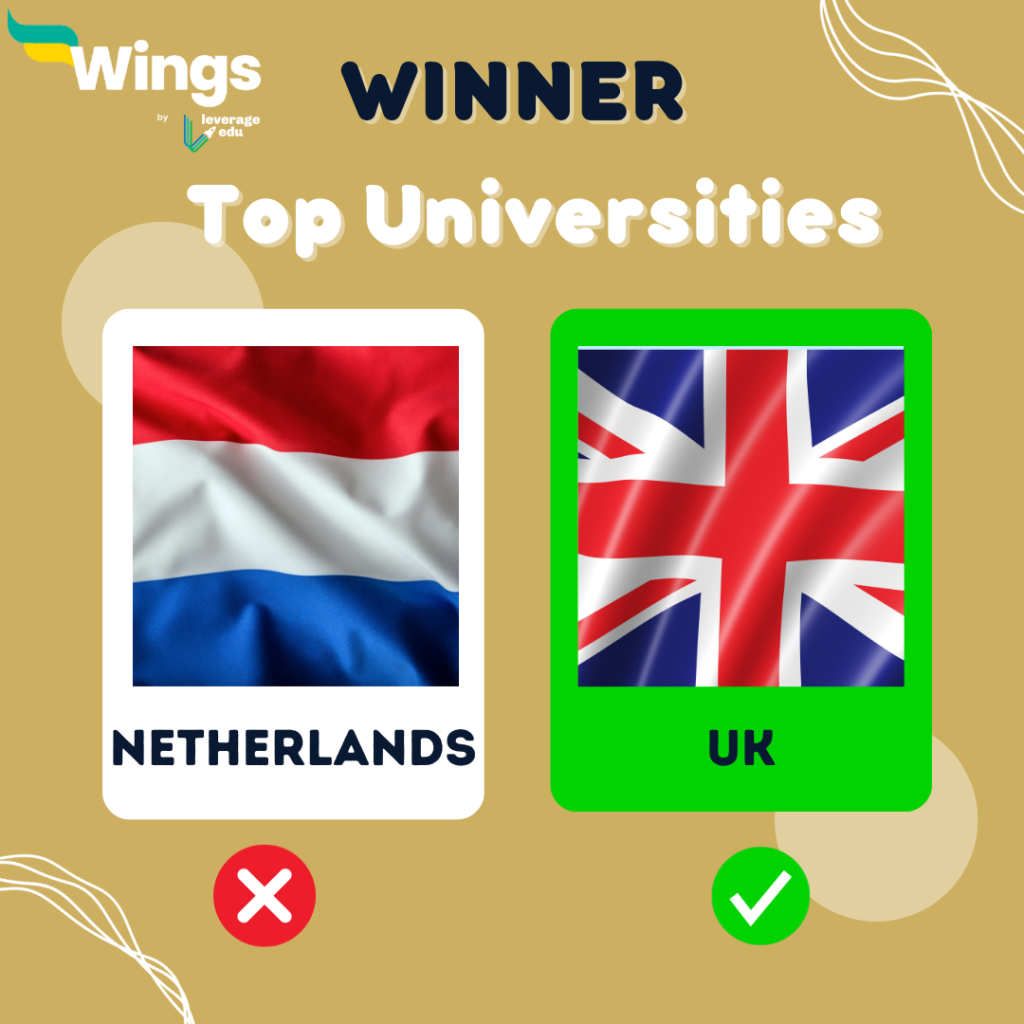
Also Read: Part-Time Job Opportunities In Netherlands
Admission Requirements
When choosing whether to pursue a degree in the Netherlands or the UK, you need to carefully consider the criteria in each nation. In this section, we will see the entrance criteria for universities in each country.
Admission Requirements For Netherlands
In order to gain admission to the Netherlands, you need to submit the following documents:
- Results of TOEFL (minimum 550 for paper-based or 213 for internet-based) or IELTS (At Least 6),
- Mark sheets of Standard X, XII, and the bachelor’s degree (if applicable),
- The student must score a minimum of 75% in class 12.
- GMAT (minimum 550) or GRE (minimum 310 to 330) score,
- Results of Dutch language test Staatsexamen NT2 only for enrolment for programs in Dutch,
- Two letters of recommendation (LOR) from the employer/manager (if you have work experience),
- Motivation Letter,
- Resume,
- Portfolio (in case of students applying for art and design courses or architecture programs),
- Others (Certificates/achievements at the state and national level and extracurricular activities),
- Proof of funds,
- A copy of your passport, and
- Health insurance.
Admission Requirements For UK
Here are the admission criteria for the universities in the UK:
- The students need to score 70-100 on TOEFL, 6.5 on IELTS, 54+ on PTE, and 105-120 on the Duolingo Test.
- The applicants should be able to provide the following documents:
- A valid passport
- ID proof
- Academic transcripts
- Statement of Purpose
- Letters of recommendation
- English language proficiency scores
- CV/ Resume
- Other exam scores, if any
- Portfolio (if applicable)
- The students are also required to apply for the Tier 4 student visa
- Proof of funds and other bank statements
- They need to have at least 65% marks in their Class 12 exam.
Which Country is Better?
As we can see, the admission process for universities in both the Netherlands and the UK is equally hard. But, the acceptace rate of the universities in Netherlands is more in comparison to the UK. Hence, the Netherlands receive +2 in this round of our Netherlands vs UK contest.
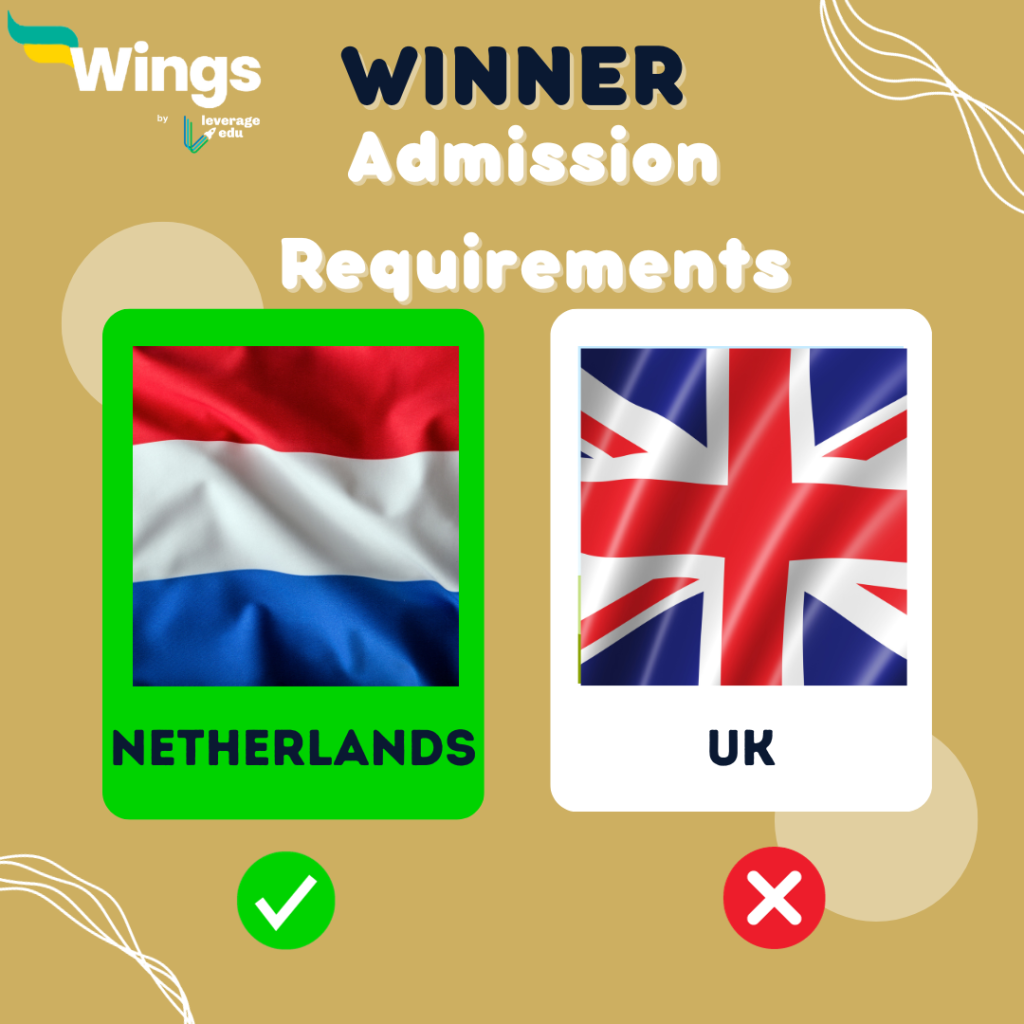
Also Read: List of MBA Scholarships in the Netherlands
Tuition Fees
We will discover which country has the lowest cost of education in this section. The country with the lowest educational cost will be granted +2 points. So, let us compare tuition fees in the Netherlands and the UK.
Tuition Fees in the Netherlands
As per the websites of the universities in the Netherlands, this is what the average annual tuition fees look like in the country:
| Study Program | Average Annual Tuition Fee |
| Undergraduate | €6,000 – €15,000 |
| Postgraduate | €8,000 – €20,000 |
| Doctoral | €6,000 – €20,000 |
Tuition Fees in the UK
According to the websites of the universities in the UK, this is what the average annual tuition fees in the UK looks like:
| Study Program | Average Annual Tuition Fee |
| Undergraduate | £8,000 – £30,000 |
| Postgraduate | £12,000 |
| Doctoral | £20,000 – £50,000 |
Which Country is Better?
The tables above demonstrate that the cost of studying in the Netherlands is lower than in the UK. As a result, we are granting a +2 score to the Netherlands in this round of our Netherlands vs UK contest.
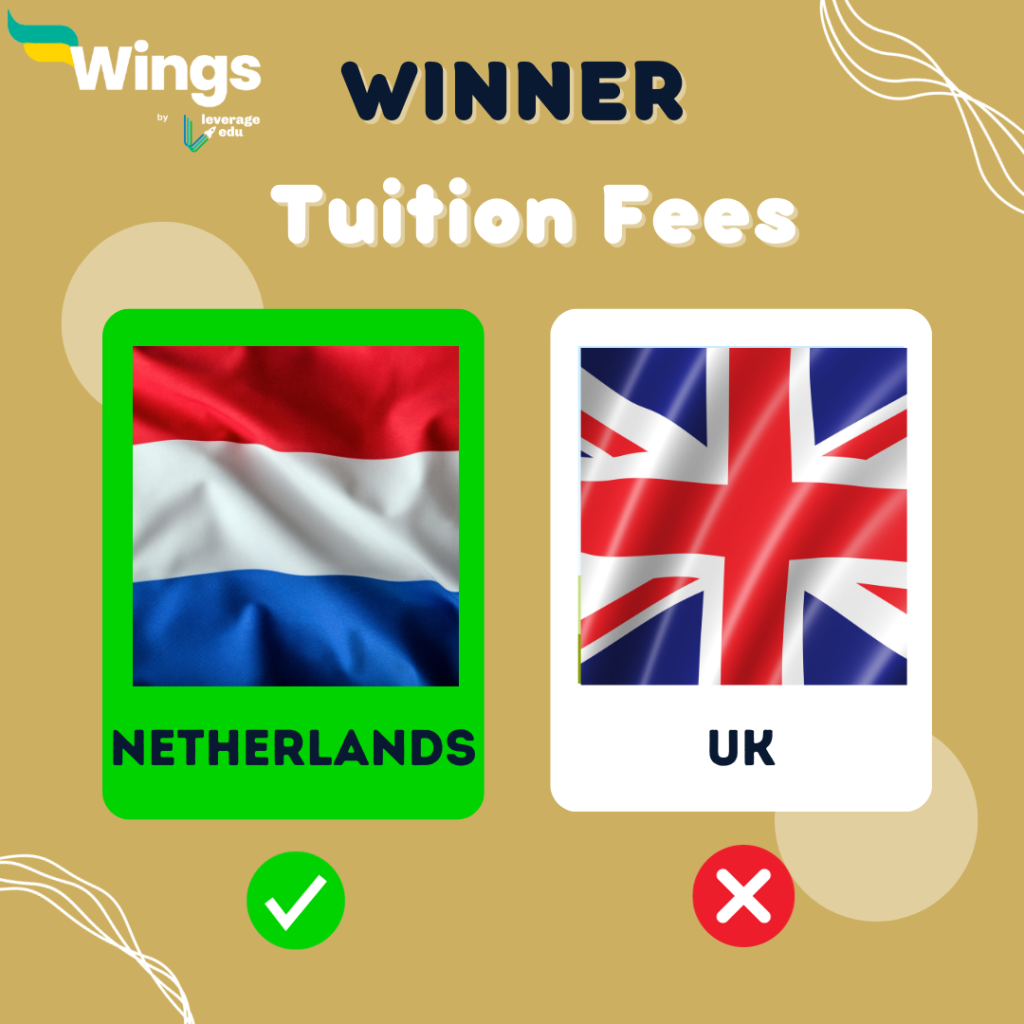
Also Read: PhD in the Netherlands
Living Expenses
The cost of living is among the biggest concerns of international students when they are deciding on their study-abroad destination. So, let’s compare the living expenses in the Netherlands and the UK.
Cost of Living in the Netherlands
This is what the cost of living in the Netherlands looks like as per the Numbeo:
| Monthly Rent | €967.26 – €1,817.26 |
| Average Apartment Price (Price per Square Metre) | €3,669.49 – €5,044.22 |
| Average Cost of an Inexpensive Restaurant Meal | €15 |
| Average Transportation Cost (Monthly) | €80.95 |
| Average Cost of Utility (Monthly) | €277.51 |
Cost of Living in the UK
This is what the cost of living looks like in the UK as per the Numbeo:
| Monthly Rent | £723.47 – £1,606.95 |
| Average Apartment Price (Price per Square Metre) | £3,333.25 – £4,456.38 |
| Average Cost of an Inexpensive Restaurant Meal | £15 |
| Average Transportation Cost | £67.9 |
| Average Cost of Utility (Monthly) | £252.75 |
Which Country is Better?
The cost of living in the Netherlands is lower than the cost of living in the UK, as apparent from the above tables. Hence, we are giving +2 points to the Netherlands in this section of our Netherlands vs UK contest.
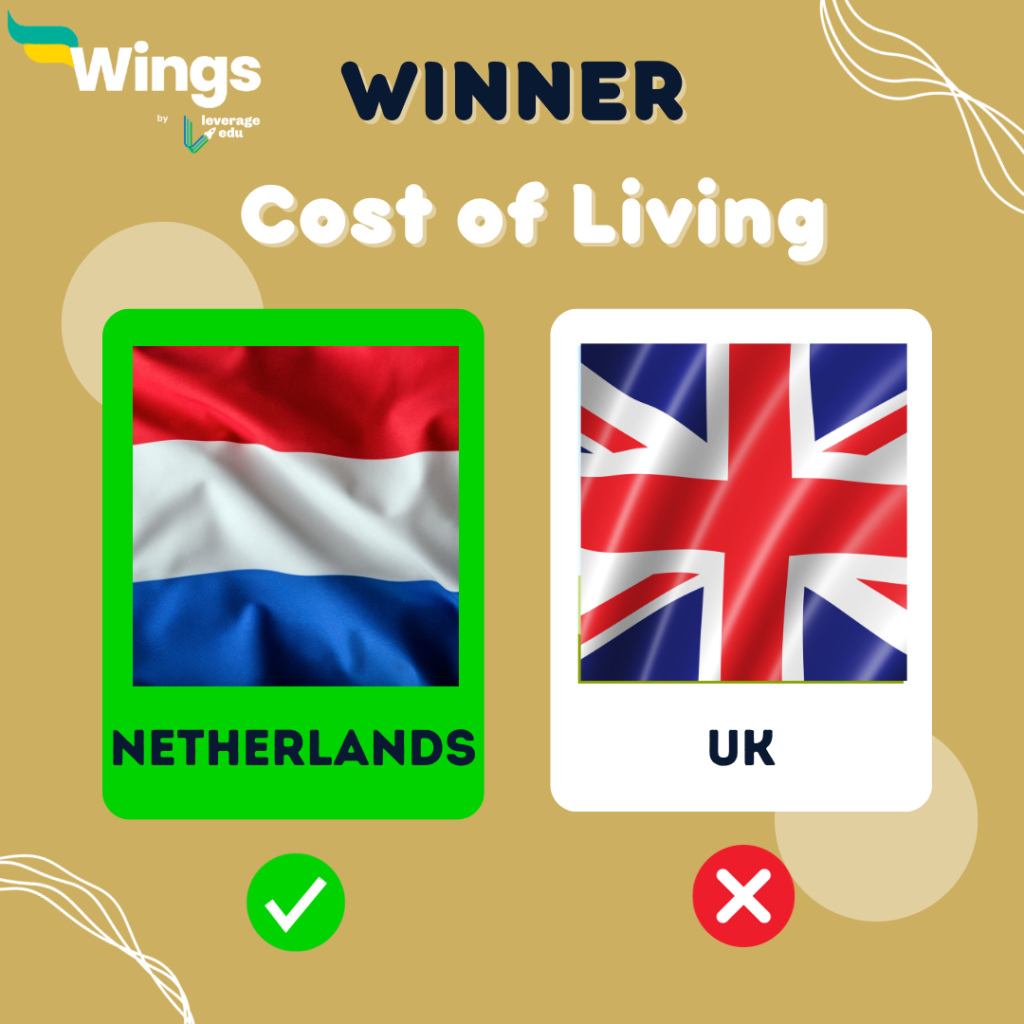
Also Read: BTech in UK
Work Permit and PR
Students often pursue education abroad with the aim of finding employment and eventually acquiring permanent residency. Let’s have a look at how easy it is to get a work visa and permanent residency in the Netherlands and the UK.
Work Permit in the Netherlands
Here is how a work permit is given in the Netherlands:
Eligibility Criteria for a Work Permit in the Netherlands:
- You are required to have an employment contract with an employer in the Netherlands.
- You should earn at least the minimum wage for employees over the age of 23.
- Your employer should be able to show that the position could not have been filled by a Dutch or other EU/EEA national.
Apply for a Work Permit in the Netherlands:
All applicants need to submit their visa application in person at the Dutch mission, embassy, or consulate in their nation of residence. If this is not possible, then they can reach out to a Dutch mission in a neighbouring country. The Dutch mission will attach a visa sticker to the employee’s passport after the approval of the application.
The processing of a work permit for the Netherlands can take from 2 Weeks to 90 days.
PR in the Netherlands
Non-EEA residents can get permanent residency after staying in the Netherlands for more than 5 years.
Work Permit in the UK
Here is how a work permit is granted in the UK:
Eligibility Criteria for a Work Permit in the UK
A work permit cannot be received directly from the UK. In the United Kingdom, your employer needs to apply on your behalf. The nature of your activity and the kind of license you get will determine the time of the authorisation of your visa.
In order to get a work permit in the UK, you need to have:
- UK Job details,
- Passport & travel history,
- Certificate of Sponsorship,
- English Language Proficiency,
- Educational and business credentials, and
- Evidence you are located outside the UK & employed by a non-UK-based company.
Apply for a Work Permit in the UK
The work visa is designed for highly skilled and qualified foreign workers who can contribute to the economic growth and productivity of the UK. This visa category is accessible to entrepreneurs, investors, and exceptional talent.
This category covers professions of:
- IT specialists;
- Doctors (Physicians);
- Engineers;
- Finance experts;
- Scientists;
- Innovators;
- Entrepreneurs;
- Other
You usually get a decision on your work visa within 3 weeks of applying.
PR in the UK
In the United Kingdom, PR is also called Indefinite Leave to Remain (ILR). In the majority of situations, you must have continuously resided in the UK for a minimum duration of 5 years before applying for UK PR. However, the length of time required to obtain UK PR status is determined by the kind of UK visa you hold.
Which Country is Better?
As you can see, it is easier to get a work permit and PR in the UK than in the Netherlands. Hence, we are granting +2 points to the UK in this round of our Netherlands vs UK contest.
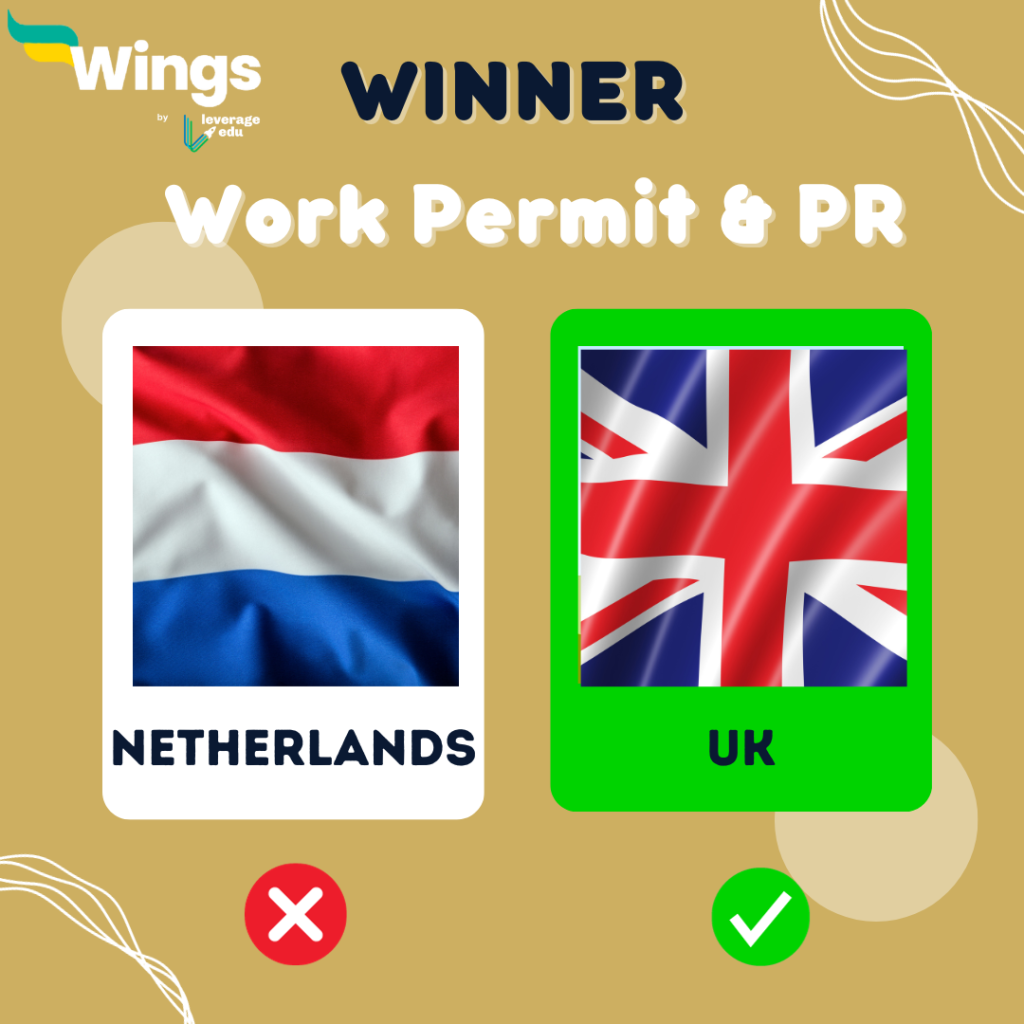
Also Read: MRes in the UK
Average Salaries: Netherlands vs UK
The average salary after graduation is €46,665 per year in the Netherlands as per WeAreDevelopers, while the average annual wage of a postgraduate in the nation is €56,87 according to Glassdoor. On the other hand, the average wage in the UK is £29,500 per year after graduation according to Indeed. The average yearly salary of a postgraduate is £30,442 in the country.
Which Country is Better?
It is clear from the above comparison that the average salary in the UK is more than in the Netherlands. Hence, we are granting +2 points to the UK in this section of our Netherlands vs UK contest.
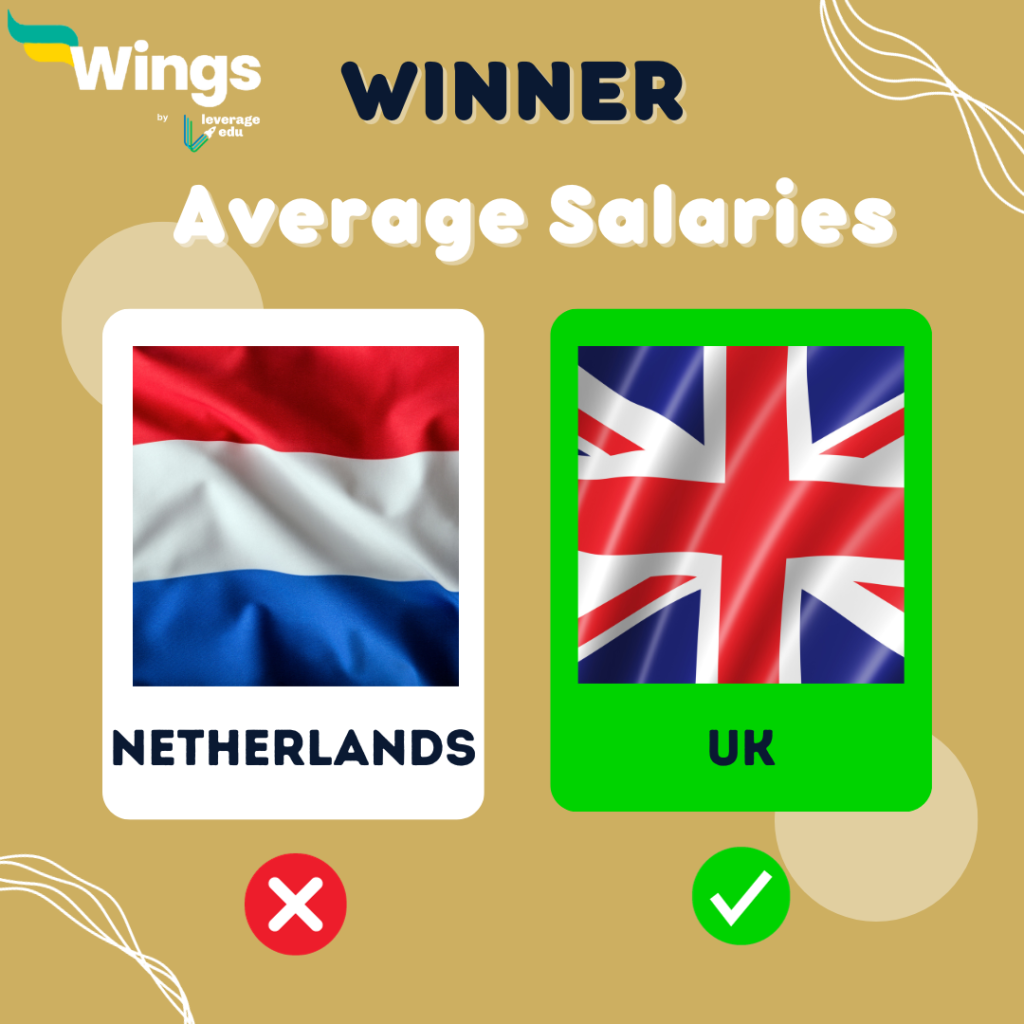
Also Read: Masters in Civil Engineering in UK
Other Major Elements
Let’s see some additional important things to consider while deciding where to study abroad. Here are some of these important considerations:
Climate
The climate in the Netherlands is usually slightly warmer than the UK. The winter season can get fairly cold and temperatures often go below zero. Coming to the UK, the country is notorious for being chilly, dreary, and rainy.
Safety
Netherlands in general is a very safe country. Crimes related to drugs, murder, and other forms of human aggression are extremely low here. Similarly, the UK is known to be a very safe country. Even though there are some parts that are dangerous and should be avoided, the country is completely safe for the most part.
Culture for International Students
The Netherlands is a very welcoming nation for overseas students. It has a rich and vibrant culture, and Dutch people are known for their friendliness and open-mindedness. In the UK, simple politeness is always expected. British people like to hear ‘thank you’ and ‘please’. People are known to be friendly there but can be reserved while talking to strangers, like in India.
Also Read: Best MBA Colleges in UK
Conclusion
When we compute the scores of the Netherlands and the UK, we discover that both of them has received a total score of 6. Hence, both of them are winners in their respective parameters.
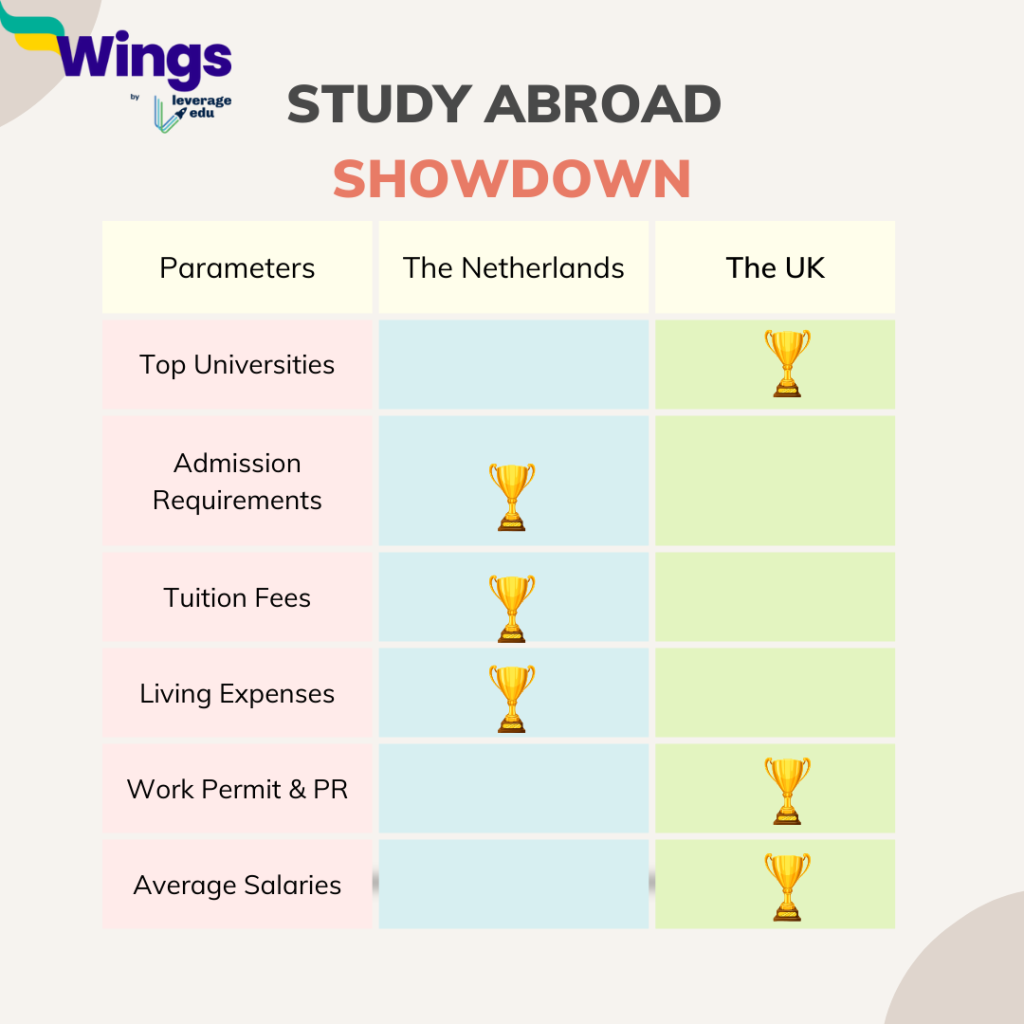
But please note that both the Netherlands and the UK have pros and cons. It is advised that you select a degree or topic of study before applying for admission to any of the country’s universities. Take into account the educational facilities and financial aid available for your selected degree to make a better-informed decision. With that being said, both the Netherlands and the UK are excellent study-abroad destinations.
Also Read: Study in UK 2023
FAQs
Ans. Studying at a university in the Netherlands is less expensive than studying at a university in the UK. This is why the number of students in the universities of the Netherlands has increased.
Ans. There are numerous reasons why moving to the UK is worth it. Some of the reasons are high salary packages, world-class education, and high standards of healthcare.
Ans. The Netherlands is a unique non-English-speaking country where about 95% of the population speaks English. It is a very pleasant, convenient, and comfortable place to study, live, and work.
So, this was all about the Netherlands vs UK. Many Indian students dream of pursuing education in foreign nations due to the exposure and career growth they offer. Consider joining a free counselling session with Leverage Edu if you plan to study abroad.


 One app for all your study abroad needs
One app for all your study abroad needs











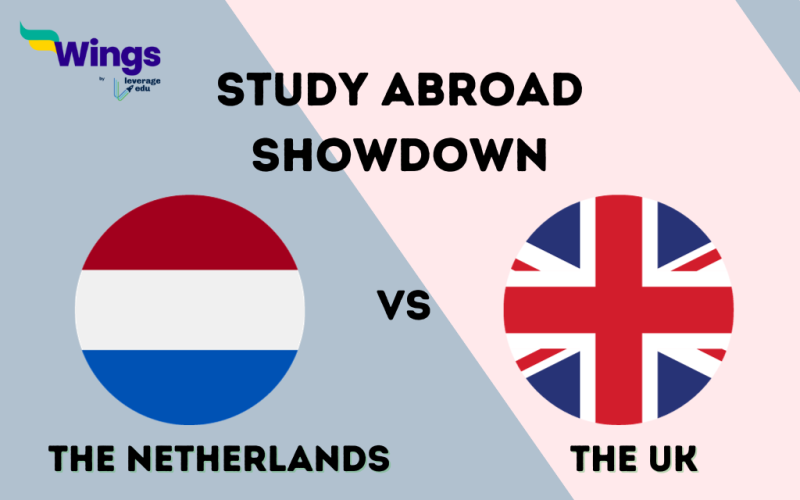
 60,000+ students trusted us with their dreams. Take the first step today!
60,000+ students trusted us with their dreams. Take the first step today!